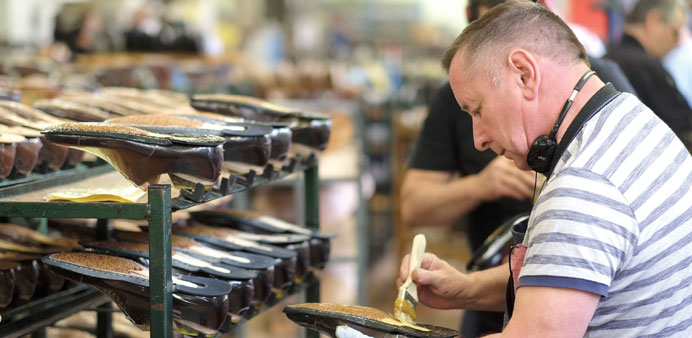A worker uses a brush to apply sealant to the outer sole of the bottom of a pair of shoes, on the production line at a shoe factory in Northampton, UK. The country’s GDP rose 0.3% in the first quarter, matching an initial estimate, the Office for National Statistics said in London yesterday.
Bloomberg/London
Consumer spending and business investment helped the UK economy to its longest stretch of growth since the financial crisis as trade continued to act as a drag.
Gross domestic product rose 0.3% in the first quarter, matching an initial estimate, the Office for National Statistics said in London yesterday. It was less than the 0.4% increase forecast by economists in a Bloomberg survey.
While the economy has expanded for nine straight quarters — the longest sprint since 2008 — there is little sign of the shift away from domestic demand promised by David Cameron five years ago. The prime minister has pledged to use his election victory this month to boost productivity.“It confirms the picture of somewhat weaker growth in the first quarter than in recent ones,” said ONS chief economist Joe Grice. “But no single quarter’s figures should be given undue weight.”
The pound lost ground after the figures were published and was down 0.5% at $1.5285 as of 12:39pm London time. The 10-year gilt yield slipped 5 basis points to 1.84%. Consumer spending rose 0.5% and investment grew 1.7%. Exports fell 0.3% and imports rose 2.3%. As a result, net trade knocked 0.9 percentage points off growth, the most since the third quarter of 2013. Government spending climbed 0.6%. The ONS cut its initial estimate of services growth to 0.4% from 0.5%, due to computer programming and consultancy work. That offset upward revisions to construction and industrial production.
The US will publish its second estimate for first-quarter GDP today. Economists forecast that the annualised change will be revised to a 0.8% drop from a 0.2% increase. Based on the same measure, the UK grew 1.2% in the three months through March.Consumer spending is being underpinned by falling prices and rising wages. The increase in business investment followed a contraction at the end of last year. GDP expanded an unrevised 2.4% from a year earlier.
Separately yesterday, the Bank of England said lending to small and medium-sized companies under its Funding for Lending Scheme rose £0.6bn in the first quarter after declining in the last three months of 2014. The BOE also said credit conditions generally have improved for smaller firms.
A key challenge for Cameron’s government is to increase productivity, as output per hour remains below its pre-crisis levels.
The Bank of England expects first-quarter growth to be revised up and slack in the economy to be erased within a year, leading economists to predict officials will raise the benchmark rate from a record-low 0.5% early next year.
“With business investment reaching its highest level in a decade, and the Funding for Lending Scheme driving investment to small and medium-sized enterprises, it is clear that the foundations for a sustainable recovery are being laid, the UK Treasury said.

